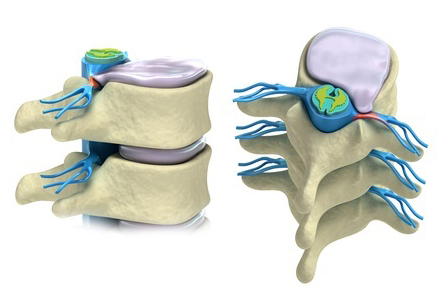

A lumbar disc herniation (LDH), also referred to as a herniated disc, is a localized displacement of disc material, which may initiate changes in the disc and adjacent structures such as the nerve root, a condition referred to as a pinched nerve. Symptoms may also manifest in the spinal canal. LDH symptoms don’t always mean the disc itself is painful, but rather the material that is leaking out of the inside of the disc is pressing against or irritating a nearby nerve. This type of pain can radiate to other parts of the body, including from the low back to the leg, or from the neck to the arm.
It is possible to have an LDH without knowing. Not all herniated disks cause pain. Or the other way around, patients attribute their discomfort to a herniated disk when the disk is actually not the cause.
The most common signs and symptoms of disc herniation involve sensory or motor impairments. Sensory impairments include sharp, shooting, electrical-type pain sensations, as well as paresthesia (pins and needles) or numbness. Motor impairments are evident with either muscle weakness or atrophy. Lumbar nerve roots feed the nerves of the lower extremities, so symptoms from lumbar disc herniation are generally felt in the lower extremity, although pain may be felt in the back as well. The cervical nerve roots feed the nerves of the upper extremities, thus referring pains to the arms and hands.
Reducing tightness in the thorax, lumbar, cervical and spinal muscles help decrease stress on the intervertebral disc, and can provide relief to LDH symptoms.
